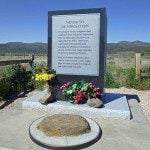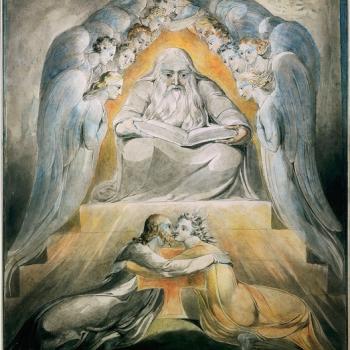Lectionary Reflections
Isaiah 43:1-7
January 10, 2016
First Sunday after the Epiphany
I have a uniquely personal connection to this text, a connection that I think might help us employ it with special energy this Sunday. Some ten years ago, my wife, Rev. Diana Holbert, elected to have a major back surgery. She had had severe back pain for many years before this, the result of a great deal of dancing, first as a student and teacher of ballet, and then as a liturgical dancer in numerous churches around the country and the world. One particularly painful event stands out in my mind.
She and I had been asked to record for the Disciple Bible Study a dance based on the hymn, "Eagles' Wings." I would sing the hymn while she interpreted it through dance. We flew to Nashville for the recording, and all day, for some eight hours, I sang and she danced that beautiful hymn. After each take (I cannot now remember how many times we did the piece), I would have to push Diana's back into alignment before she could dance again. The agony was terrific! Soon after that excruciating event, we were flying to Alaska for me to speak and for her to dance. We had to change planes en route, and she found she simply could not stand up to exit the plane in order to catch the next one. She had to be taken off in a wheelchair.
Clearly, she had to have surgery on her back if she were ever to reduce the pain and make her life more livable. We both were very frightened by this prospect. The surgery entailed building a tiny titanium cage to hold up the vertebrae at the 4 and 5 level of the spinal column. But to do that, the surgeon would need to displace the major nerves that run up the spinal column to get to the place he needed to place the cage. After placing the cage in its designated spot, the nerves would be replaced in the column and the area sewn up. It was a four-hour surgery, and the result was unimaginable pain for the first several days. Diana could do little else but lie still and ask for more medication.
The first drug made her so sick as to render it useless. The doctor switched medication, and that seemed to work better. But those early days were torturous. Again and again, Diana would ask for Scriptures that had served her in the past. You could perhaps guess the ones she loved; they are very familiar: Psalm 23, various verses from Paul's letter to the Philippians (e.g. "again I say rejoice!"), among others. But the one she most relied on was Isaiah 43. Her bed of pain put her deeply in touch with the exiled Israelites, who sought hope in a land far from their home, who could see no easy end to their own agonizing horror, their minds filled with scenes of the destruction of their holy city, their nostrils assailed by the stench of death, their ears assaulted by the screams of their dying comrades who would remain in the ruins of Jerusalem forever.
"And now thus says YHWH, the One who created you, Jacob, the One who fashioned you, Israel; do not be afraid, for I have "go'eled" you. I have called you by your name, because you are mine" (Is. 43:1). This verse sounded again and again on my lips and into Diana's ears, because it said what she so desperately needed to hear. Let's look at its wonders closely.
In the first clause, Isaiah leaves no doubt that YHWH is creator of Israel, and that that One who created them had not forgotten them, though their exile has severely tested that belief. The prophet uses two familiar verbs to affirm YHWH's creative act: bara, the very first verb found in the Bible (Gen. 1:1) and yatzer, that artisan verb used by the storyteller of Genesis 2 to describe the potter YHWH fashioning us human beings on the divine wheel, one clay masterpiece at a time (Gen. 2:7). As YHWH created earth and sky, so YHWH created Israel; as YHWH shaped 'adam at the very beginning, so YHWH shaped Israel. As YHWH created and fashioned Israel, so YHWH created and shaped Diana.
"Do not be afraid!" In the artificial light of the hospital room and amid the beeps and boops of the myriad machines, the word of God exploded over and over: "Diana, do not be afraid!" The pain was all too real, but the fear of the pain could be handled if the conviction of God's call was experienced as more real than the pain. And why could God's demand to not be afraid be trusted? Because YHWH is in the business of being a go'el. Here is one of the Bible's great words, but as such its full translation is far from easy.
It means "to redeem," something like reclaim, recover, retrieve, rescue, ransom, deliver. YHWH has done all that for Israel, and they then have every reason to discard their fear, for the YHWH who has acted for them in the past, is about to act in a similar way for the people now. But the word also can mean "to vindicate," something like exonerate, absolve, acquit, justify, uphold. Whatever foul deeds we have performed, God is always ready to vindicate us, to acquit us of those deeds. And thirdly, YHWH as "redeemer" can be said to act directly on behalf of YHWH's people. Surely, the most famous (or infamous) use of the word in this way is found at Job 19:25. Though many have long imagined that Job there is referring to YHWH as his "redeemer," the context suggests strongly that Job does not have YHWH in mind, but some dark avenger who will get even with God, a God who has, according to Job, destroyed Job's hopes and must be held to account.





